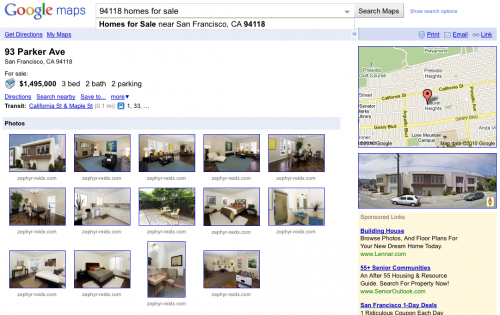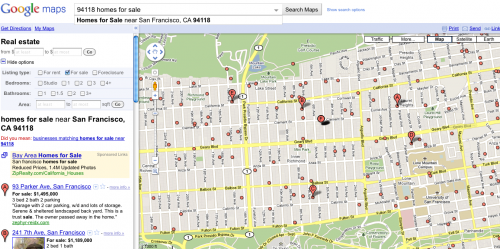Google’s Maslan Says The Company Not Pushing Into Real Estate
In an on-stage interview during the Inman Real Estate Connect conference this week in San Francisco Google’s Carter Maslan said that the company was not pushing into real estate specifically or going to build a direct national database of property listings and become a “universal MLS”: “What we are doing in real estate is really […]
In an on-stage interview during the Inman Real Estate Connect conference this week in San Francisco Google’s Carter Maslan said that the company was not pushing into real estate specifically or going to build a direct national database of property listings and become a “universal MLS”:
“What we are doing in real estate is really (no different than) what we are doing in (other areas of) local search,” Maslan said. If there’s a property for sale, wherever its mentioned on the Web — whether on “Rotten Neighborhoods” or Trulia.com — Google wants to put those pages at users’ fingertips.
After the announcement of the intended acquisition of travel software vendor ITA many people assumed Google would make similar moves in other high-value verticals. Real estate certainly falls into that category.
In the past there had been rumors of Google wanting to make a destination site acquisition in real estate (e.g., Trulia). So far nothing has come to pass.

But while Google may not seek to control or own the listings data it clearly is interested in building a richer user experience in real estate. That includes Places Pages for individual properties.
Compared to Trulia, Zillow, Roost and other consumer destinations, however, the Google real estate experience is fairly thin overall:
I would frankly be surprised if Google didn’t seek to improve on what it currently offers and develop a deeper and more refined user experience for real estate. The additional traffic and consumer usage that it would likely bring could result in incremental advertising revenue on those pages.
Real estate ad spending is a multi-billion dollar proposition in the US, having shifted over the past several years from print newspapers to online and other media.
Today Google Earth Pro has tools and data specifically designed for the commercial real estate market. It’s just a hop, skip and a jump to the residential market. Aggregating better and richer information (online and in mobile) to support the rental or home-buying decision is something that I would expect Google to attempt to do. Indeed, it’s doing it today in a limited way.
However if Google declines to push fully into real estate we might see something more structured coming out of Redmond as Bing seeks out new verticals to conquer.
Contributing authors are invited to create content for Search Engine Land and are chosen for their expertise and contribution to the search community. Our contributors work under the oversight of the editorial staff and contributions are checked for quality and relevance to our readers. The opinions they express are their own.
Related stories
